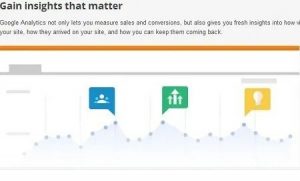When any user signs into Google, then uses Google Search to locate something of their interest, the first set of results that show up are local before anything else. This means, regardless of what the user is looking for, your results may not come up first due to the fact that your business is not local to them, or due to the fact that you’ve not used local search terms.
- Know Your Objectives
- Set Goals
- Measure Results
(Take these into account in conjunction with, ”The Other Benefits of Responsive Web Design For Your SEO and Online Success”.)
Perhaps your goals are to get more customers or leads. Whatever your goals are, be sure to set specific goals and then measure the results after any local SEO campaign. If you don’t have a locally oriented business, it’s okay, surely you can still provide service or sell to the people who live near you. That is always a good place to start with local search.
Every campaign must deal with the following:
Building a Website — You probably already have one, but if you don’t, build the website with local search in mind. Appeal to your audience that lives in the location you want to attract.
Building Links — You want links outside of your website that directs to your website. This can happen due to your social media profiles, message board profiles, blog commenting, forum commenting, guest posting, online interviews and so forth.
Creating Content — Come up with commentaries that take location into account, include the keyword terms that identify you as a business that deals comfortably with the locals by naming your state and town.
Using Social Media — The social media’s importance couldn’t be stressed enough in today’s online marketing climate. Get involved with social media, like Facebook and LinkedIn for marketing locally.
First, get a handle on the keywords you want to use to enhance local search for your area. For instance, if you want to help the local people to learn how to work from home, you can simply use the phrase work from home in your state or your town within the content, within the article or blog post titles, and you can also put the address of your business on every page of your website if deemed appropriate.
Go to all your social media accounts and update the profiles to include your name, address, and phone number. These are essential to doing business locally and attracting local search. If you are using a non-local number, you might want to consider acquiring a local one because that is what makes those who want to do business locally most comfortable and also the local number identifies you being situated in that location.
Get listed in the local directories such as Yellow Pages, Chamber of Commerce, and on industry sites as well. Consider being listed on Yelp.com, local.yahoo.com, Citysearch.com, FourSquare.com and others. If you want to host local events, start a Meetup.com group, or list any local site that announces events in your area. Start going to local events. While some of these ideas might not seem to have to do with SEO or SEM, it actually does. Anything that can get your business mentioned in context with its location is a win for local search engine marketing. By doing all of these things you should start showing up in SERPS within 60 to 90 days. Since local search is the first type of search that your market sees, give it a try and see if incorporating local search into your SEM doesn’t improve traffic and conversions.
And also, something nice to mention, Quality Content Is Reigning This Year and Is Important for SEO and ranking.







